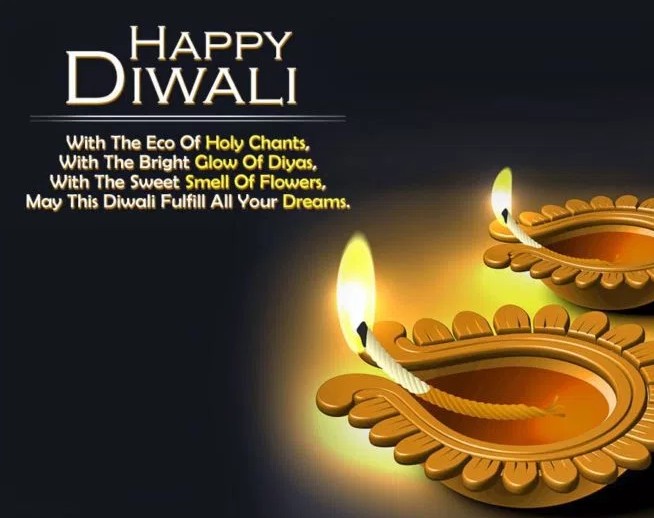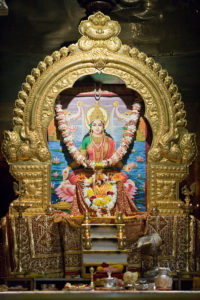
- This event has passed.
Deepavali – The Festival of Lights
November 12, 2023 - November 13, 2023

Diwali is one of the most popular festivals of Santana Dharma, it spiritually signifies the victory of light over darkness, good over evil, knowledge over ignorance, and hope over despair. The celebrations includes millions of lights shining on housetops, outside doors and windows, around temples and other buildings in the communities The main festival night of Diwali coincides with the darkest, new moon night. People clean their homes and decorate them for the festival. People also buy gifts for family members and friends which typically include sweets, dry fruits, and seasonal specialties depending on regional harvest and their customs. It is also the period when children hear ancient stories, legends about battles between good and evil or light and darkness from their parents and elders. Youth and adults help with lighting patakhe (fireworks)
Most common puja is for Lakshmi – the goddess of wealth and prosperity and Ganesh for knowledge and wisdom. On Diwali night, fireworks light up the neighborhood skies. Later, family members and invited friends celebrate the night over food and sweets. Diwali means rows of lighted lamps. It is a festival of lights and every Indian celebrates it with joy. During this festival, people light up their Places. They leave the light on in buildings in their belief that Goddess Lakshmi will not find it difficult in finding her way in.
In Northern part of India they celebrate the story of King Rama’s return to Ayodhya after he defeated Ravana by lighting rows of clay lamps. 
Southern part of India celebrates it as the day that Lord Krishna defeated the demon Narakasura. Diwali is the time to enjoy the delicious sweets, light the bright lamps and have a sparkling fire work celebration with lot of different varieties of crackers.. The festival has been celebrated for ages in India. But do you have any idea how and when did it first originate? The history of Diwali celebrations is nearly as old as the history of India. Here they have their roots in the different kinds of legends and mythical tales that can be found in the ancient Hindu scriptures called Puranas.
Mahabharata reveals to us how the five royal brothers, the Pandavas, suffered a defeat in the hands of their brothers, As a rule imposed on  them, the Pandavas had to serve a term of 13 years in exile. When the period was over, they returned to their birthplace Hastinapura on ‘Kartik Amavashya’ (the new moon day of the Kartik month). To celebrate the joyous occasion of their return to Hastinapura and to welcome back the Pandavas, the common people illuminated their state by lighting bright earthen lamps everywhere.
them, the Pandavas had to serve a term of 13 years in exile. When the period was over, they returned to their birthplace Hastinapura on ‘Kartik Amavashya’ (the new moon day of the Kartik month). To celebrate the joyous occasion of their return to Hastinapura and to welcome back the Pandavas, the common people illuminated their state by lighting bright earthen lamps everywhere.
It is also believed that on this very Diwali day, the Goddess of wealth, Lakshmi rose up from the ocean. The Hindu scriptures tell us that long long ago both Devas (gods) and Asuras (demons) were mortal. They had to die sometime or other, like us. But they wanted to live forever. So they churned the ocean to seek Amrita, the nectar of immortality (an event mentioned in the Hindu scriptures as “Samudra-manthan”), during which many divine objects came up. Prime among these was Goddess Lakshmi, the daughter of the king of the milky ocean, who arose on the new moon day (amaavasyaa) of the Kartik month. That very night, Lord Vishnu married her. Brilliant lamps were illuminated and placed in rows to mark the holy occasion. This event is supposed to have given rise to an annual celebration and at the same time each year. Even Now, Hindus celebrate the birth of goddess Lakshmi and her wedding to Lord Vishnu on Diwali and seek her blessings for the coming year. Diwali is celebrated by all Hindus, Jains, and Sikhs and Newar Buddhists to mark different historical events, and Sikhs celebrate Bandi Chhor Divas (Diwali). They all symbolise the victory of light over darkness, knowledge over ignorance, good over evil, hope over despair. May God Bless you and your family and friends abundantly in this great occasion.
